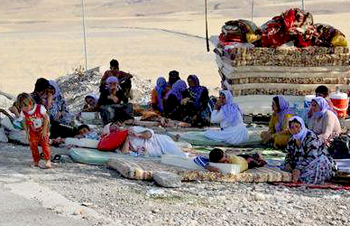
Islamic State militants meanwhile killed around 100 Yazidi men near the northern Iraqi town of Sinjar, after they refused to convert to Islam. The men were killed on Friday, while women and children were detained and taken to an unknown place, surviving residents told dpa.
The United States launched airstrikes with jets and drones against Islamic State targets in northern Iraq, striking targets near the Mosul Dam and the city of Irbil, the U.S. military said.
“U.S. Central Command conducted these strikes under authority to support humanitarian efforts in Iraq, as well as to protect U.S. personnel and facilities,” it said in a statement.
Nine airstrikes destroyed or damaged four armoured personnel carriers, seven armed vehicles, two Humvees and an armoured vehicle, the U.S. military said.
At least 20 militants were killed and 11 wounded in U.S. strikes in the vicinity of the Islamic State-held Mosul Dam, the Kurdish military said.
U.S. warplanes mounted a series of strikes against gatherings of insurgents along the facility, they said.
The Islamic State seized the Mosul Dam earlier this month. It is located on the River Tigris, which also runs through Baghdad.
In recent weeks, the militants have overrun several towns in northern Iraq, where minority Christians and Yazidis live, triggering an exodus. Others have been besieged in their towns and ordered to convert or face death, witnesses said.
The militants consider the Yazidis, followers of a religion with pre-Islamic origins, to be infidels.
German Foreign Minister Frank-Walter Steinmeier on Saturday assured displaced Yazidis of additional humanitarian assistance.
“We need to create a situation where [the Islamic State] can no longer draw support from the Iraqi population,” he said. He was speaking during a tour of a refugee camp sheltering Yazidis in Irbil, the capital of Iraq’s autonomous region of Kurdistan. Mr. Steinmeier had earlier on Saturday met with Iraqi President Fouad Massoum, a day after European ministers agreed to arm Iraq’s Kurdish forces battling the jihadists.
“The daily images from Iraq of killings and massacres have led to shock and horror across the world,” Mr. Steinmeier said after arriving in Baghdad.
“A terrorist gang of murderers is trying to subdue the country,” he said, referring to the al-Qaeda splinter group that has captured vast chunks of northern and western Iraq since June.
France was the first Western European country to announce that it would join the U.S. in arming Kurdish forces in northern Iraq against the militants.
With the regular Iraqi Army in disarray, the Kurdish forces are widely seen as the best hope of halting the militants, who have in recent weeks widened their control without encountering much of a fight.
On Friday, the U.N. Security Council adopted a resolution condemning radical Islamists operating in Iraq and Syria, and threatened to act against any parties that finance or assist them.








Comments
Add new comment